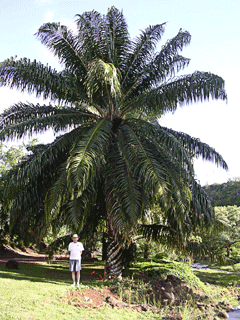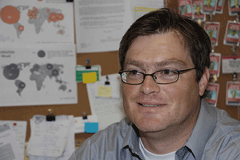Biofueling Deforestation
Air Date: Week of April 27, 2007

An oil palm tree, an important source of biofuel. (Courtesy of U.S. DOE Genome Programs)
Dr. Fred Stolle from the World Resources Institute tells host Jeff Young that Southeast Asia’s rainforest could be flattened to provide palm oil for bio-diesel.
Transcript
YOUNG: There’s no silver bullet in the search to replace oil. Biofuels are also booming—things like ethanol from corn and sugar cane, and diesel derived from palm oil, are attracting interest and investment worldwide. The European Union has set an ambitious target: to replace nearly six percent of petroleum with biofuels in just the next three years.
That will take a lot of plants, and a lot of cropland that Europe simply does not have. So the E.U. is looking to the developing world, particularly Southeast Asia. That’s where Fred Stolle is keeping an eye on forests for the World Resources Institute. Stolle says Europe’s appetite for biofuel could take a big bite out of the region’s forests.
STOLLE: You would need around three million acres of biodiesel to replace one percent of the needs of the European Union. Probably that crop would come from Southeast Asia and mainly at the moment I would say Malaysia and Indonesia, oil palm, which is the main favorite crop for exchanging biodiesel.

Dr. Fred Stolle Program Manager Forest Landscapes in Southeast Asia World Resources Institute's People and Ecosystems Program (Photo: World Resources Institute)
YOUNG: Hmm. Oil palm from Malaysia and Indonesia. Is that a good thing for those countries?
STOLLE: Well, it’s a mixed bag. It could be a good thing if you think about how many people could work in those plantations. The development for those countries, I mean they might be the new OPEC countries of the future. But, it could be devastating for the environment if not done right.
YOUNG: Why’s that?
STOLLE: Well, you make oil palm plantation, at the moment on tropical rainforest. You have to cut the forest. You have to burn the forest. It’s got a lot of CO2 emissions. And also on the side of all kinds of biological functions you might go wrong.
YOUNG: And what makes it especially good for a biofuel?
STOLLE: Well, it has a high energy content. So, of you compare let’s say the three big crops everybody is talking about. There is sugar cane, and that has just the highest rate of return on energy. Oil palm follows directly behind it. It’s also very high contents of energy matter. Unfortunately corn has a very low energy output.

An oil palm tree, an important source of biofuel (Courtesy of U.S. DOE Genome Programs)
YOUNG: Part of why people are so hot for biofuels these days is the idea that we need to reduce our carbon dioxide emissions from the fuels that we burn. If we are using biofuels are we sure that we’re really helping on the global warming equation there or not?
STOLLE: Again sorry to say it’s a mixed bag. Yes, if you think about there’s now a grassland that’s in Indonesia and you put an oil palm plantation there and you store more carbon it will be really beneficial. But in the same way if you would make those plantations on a peat swamp forest you burn the peat swamp, you burn the forest you put a plantation that you actually increase climate change you have a lot of emission from carbon. In Indonesia they have the biggest peat swamps in the world and these peat swamps are 30-40 feet thick. And it’s all carbon. And so if you burn that it would be an enormous emission of carbon would give that. And that’s very detrimental for climate change.
YOUNG: So where do you see things going? Are you hopeful that we’re going to get a grip on things and make biofuels work the way we want them to, or are you worried that biofuels might backfire?
STOLLE: I am of a positive attitude. I think it will be a great asset. We can really reduce our carbon emissions so it will be good for climate change. And I think that many countries really could benefit from it also I mean, a lot of countries could diversify their energy needs. You don’t have to go to the OPEC countries only you can go to other countries to substitute part of your energy. But I think the key thing is to be sure that the certification issues are sorted out. That countries really plan ahead, they make sure it’s not many of these plantations come not from forest as it is now. And really make sure that a new there is all kind of safe guards and also countries who buy those biofuels look at those safeguards and only buy it when certain of those safeguards are in order.
YOUNG: Mmm hmm and again, we’re not just talking about Indonesia and Malaysia and pointing our fingers at them we’re saying hey, the wealthy consumer nations have a responsibility here too.
STOLLE: They definitely have a responsibility. I mean they, in the end, buy most of these products so if they don’t demand it then why would a country make the effort to do it? So in the end it is a big responsibility on this side, on the Western countries to say yes we really like biofuels but we only like biofuels if several of these criteria are met.
YOUNG: Thanks again for joining us.
STOLLE: Thank you for having me.
YOUNG: Fred Stolle monitors forests for the World Resources Institute. You can find more on the challenges of biofuels and liquid coal at loe.org.
[MUSIC: Trespassers William “Eyes Like Bottles” from ‘Having’ (Nettwerk - 2006)]
Links
U.S. Department of Energy Genome Programs
Living on Earth wants to hear from you!
Living on Earth
62 Calef Highway, Suite 212
Lee, NH 03861
Telephone: 617-287-4121
E-mail: comments@loe.org
Newsletter [Click here]
Donate to Living on Earth!
Living on Earth is an independent media program and relies entirely on contributions from listeners and institutions supporting public service. Please donate now to preserve an independent environmental voice.
NewsletterLiving on Earth offers a weekly delivery of the show's rundown to your mailbox. Sign up for our newsletter today!
 Sailors For The Sea: Be the change you want to sea.
Sailors For The Sea: Be the change you want to sea.
 The Grantham Foundation for the Protection of the Environment: Committed to protecting and improving the health of the global environment.
The Grantham Foundation for the Protection of the Environment: Committed to protecting and improving the health of the global environment.
 Contribute to Living on Earth and receive, as our gift to you, an archival print of one of Mark Seth Lender's extraordinary wildlife photographs. Follow the link to see Mark's current collection of photographs.
Contribute to Living on Earth and receive, as our gift to you, an archival print of one of Mark Seth Lender's extraordinary wildlife photographs. Follow the link to see Mark's current collection of photographs.
 Buy a signed copy of Mark Seth Lender's book Smeagull the Seagull & support Living on Earth
Buy a signed copy of Mark Seth Lender's book Smeagull the Seagull & support Living on Earth

